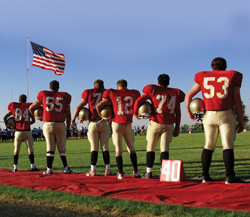Team-building ideas: April 2012
Your players respect and buy into your program more when rules are established, consequences are instituted
 When Al Rapp thought about taking a new high school football coaching job 13 years ago, he asked for a couple of game films from the school (LaSalle Institute, Troy, N.Y.) to be sent to him. When he popped in the tape he immediately noticed a team that lacked discipline.
When Al Rapp thought about taking a new high school football coaching job 13 years ago, he asked for a couple of game films from the school (LaSalle Institute, Troy, N.Y.) to be sent to him. When he popped in the tape he immediately noticed a team that lacked discipline.
“During the national anthem the players weren’t paying attention, they seemed disinterested,” Rapp recalls. “During the game there was no cohesion among the team. Players were throwing helmets when frustrated. The team was in disarray.”
Despite the lack of structure and discipline, Rapp decided to take over the LaSalle football program. The simple yet effective measures he installed turned a mediocre team the years prior to his arrival (“a lot of 3-6 and 4-5 seasons,” Rapp says) and turned it into a juggernaut at the AA level in New York while routinely playing schools with significantly more enrollment. In his first season, the squad went 11-1 and reached that state semis.“I believe in discipline in our program but, luckily, we started winning right away, which encouraged the players and parents to believe in it as well,” Rapp says.
Off-the-field changes
Rapp says soon after taking the job he had his players practicing how to line up during the national anthem, including how to stand, look at and salute the flag.
“I told them a lot of people around their ages fought for our freedom and to fly that flag, so they were going to respect it,” Rapp says.
Beyond paying respect to the flag, Rapp had to change the culture at LaSalle from a place that expects to be average to a program expecting to compete. It all starts with goal setting with the larger goals coming from the coaches.
Rapp says his team is like many in that it develops a theme for the upcoming season. Rapp and his assistants debate and discuss possible themes in the spring, then release the final decision to the players at a mini-camp in June.
“The players look forward to seeing what quote we came up with for the upcoming season. Once our quote is out there, players start believing in it and building toward it. We put it on a t-shirt for everyone and discuss the theme almost on a daily basis,” Rapp explains.
Beyond the over-arching theme of the season, Rapp encourages his players to make daily goals to attain.
“My assistants and I meet with every player on the team and encourage them to come up with their own, personal goals and post them in their lockers. Some believe in it and do it, a few others go through the motions but you need to get real goals down in writing, otherwise, you just have a bunch of dreams.”
No captains, no playbook
The development of season goals is a common rite of spring and summer for football players and coaches. Another is the naming of team captains and distributing of the playbookneither of which happens at LaSalle.
“We have a certain number of seniors on our team every year and we expect them to be leaders. Well before the season starts we have a leadership picnic on my farm where we discuss the expectations for the year and how we expect our leaders to come from this group,” Rapp explains.
Rapp adds that he does designate one or two seniors per game to walk to mid-field for the coin flip and represent the team. But, he does not name specific captains who do it every game.
“What happens if you name captains in the spring, then in the summer they do something stupid or wrong?” Rapp asks.
As for not having a playbook, Rapp says his first couple of coaching stops he worked for coaches who didn’t use a playbook. He adds in his past he’s noticed players from other teams leaving playbooks in locker rooms, on buses, etc. To eliminate the playbook getting into the wrong hands and to keep his offense simple, Rapp simply eliminated playbooks.
“If you know your right from your left and can count from one to nine, then you can play in our offense,” Rapp explains. “The odd numbers signify holes on the left side of the line and the even ones the right. So, if we call ’33’ then our 3-back is running to the 3-hole. It’s easy.
“I want players understanding the offense and not memorizing plays.”
Rapp says during the week leading up to a game, he sits players in front of a whiteboard and suggests they write down some of the formations and movements he is diagramming. So, they have a 12pt, week-to-week playbook based on opponent but nothing formal … and nothing to leave behind in a locker room for someone else to utilize.
“The players have bought into it. They understand our formations and where to go,” Rapp says. “Sometimes, as coaches, we try to get too fancy. We try to keep it simple. And, I’m a believer in contrary thinking. When everyone is doing one thing, we’re going to do the opposite.”
No parent problems
When a coach like Rapp comes into a program, pushback from parents is expected. Discipline is not as easily taught these days but Rapp says the parents have been on board with his program since he started. He adds he lays out his philosophy in his preseason meeting with parents and even provides them with his personal cell phone number.
“In August we have our preseason parent meeting. That’s where we spell out our expectations for the players and the parents, and the expectations the players and parents can have of the coaches,” Rapp says. “We go over all questions so nothing is left unanswered heading into the season. I then give all the parents my cell number and instruct them to call me with questions or concernsbut not about playing time, as that is a topic not up for discussion.”
Rapp says in his third year on the job an incident occurred in the preseason where a group of players were at a party drinking alcohol. Word made its way back to Rapp about the party, so he told the players involved he was calling in their parents.
“I told the players they are football players in our program year-round, so they need to represent us as such. The punishment for the drinking was not to play in our upcoming scrimmage,” Rapp says. “I spoke to every parent about it and all but one were supportive of the decision.”
Attending all activities
Football coaches notoriously are hard workers who pile on many hours of preparation, especially in the fall. With game film, Xs and Os, keeping track of eligibility, developing leaders and so much more, the football coach typically doesn’t have time to attend too many other school events. But, once again, this is where Rapp differs.
Rapp says the football coach is the face of the program and many times, one of the most recognizable faces in the athletic department. With this comes responsibility, so Rapp makes it a point to attend as many non-football functions at LaSalle as possible.
“We have a drill team here and I go to their events. When the National Honor Society has an induction, I’m there. If there is a band recital, I go to that too,” Rapp says. “The parents of the non-athletes appreciate it. When people see me at events, they know I care about the school and the kids who attend.
“Sometimes as football coaches we lose a bit of perspective. We’re just part of an overall athletic program. And, we’re all here to make our athletes better people in the long runthat is the basis from which my coaching philosophy stems.”





